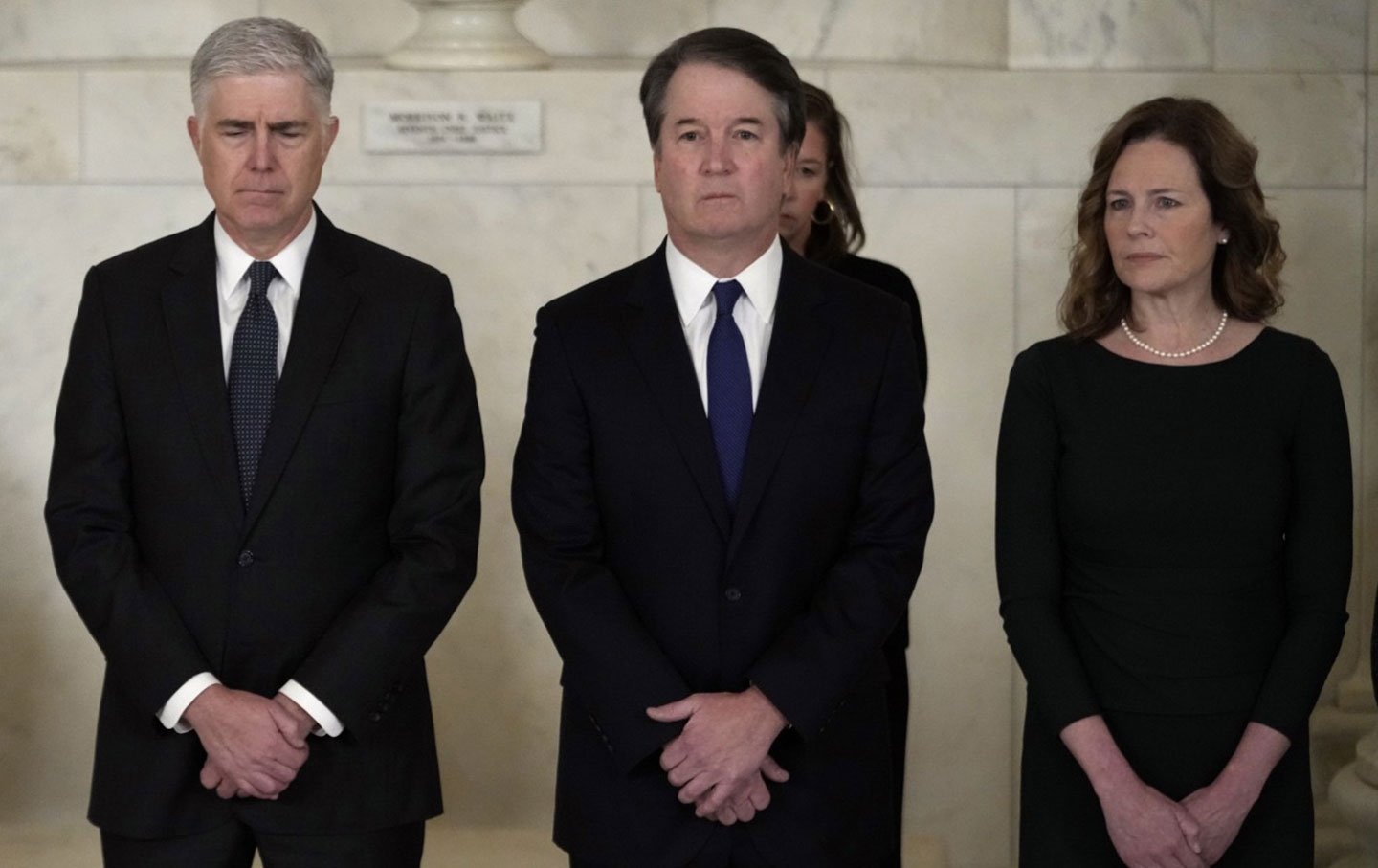We Are Witnessing the Biggest Judicial Power Grab Since 1803
During a major hearing this week, the conservative justices made clear they’re about to gut the federal government’s power to regulate—and take that power for themselves.

The Supreme Court heard two consolidated cases yesterday that could reshape the legal landscape and, with them, the country. The cases take on Chevron deference—the idea that courts should defer to executive agencies when applying regulations passed by Congress. They’re the most important cases about democracy on the court’s docket this year, and I say that knowing full well that the court is also set to decide whether a raving, orange criminal can run again for president, and whether former presidents are immune from prosecution for their crimes in the first place.
That’s because what conservatives on the court are quietly trying to do is pull off the biggest judicial power grab since 1803, when it elevated itself to be the final arbiter of the Constitution in Marbury v. Madison. They’re trying to place their unelected, unaccountable policy preferences ahead of the laws made by the elected members of Congress or rules instituted by the president. If conservatives get their way, elections won’t really matter, because courts will be able to limit the scope of congressional regulation and the ability of presidents to enforce those regulations effectively. And the dumbest justice of all, alleged attempted rapist Brett Kavanaugh, basically said so during oral arguments.
I’m contractually obligated to tell you that the cases were technically about fees that fisheries are required to pay to federal observers. But all the justices talked about was Chevron deference. Only Justice Sonia Sotomayor even bothered to mention the fish, three hours and 20 minutes into a three-and-a-half-hour hearing.
The term “Chevron deference” comes from a 1984 case, Chevron v. Natural Resources Defense Council. At issue was a provision of the Clean Air Act that required manufacturing plants to get permits before increasing toxic emissions. The Environmental Protection Agency made a rule, pursuant to the Clean Air Act, that allowed some of these industrial plants to increase emissions in certain cases without a permit, and environmental groups sued. The Supreme Court unanimously ruled (albeit with three justices recusing themselves) that the EPA had the authority to make the rule and that the courts should “defer” to the judgment of executive agencies when acts of Congress are ambiguous or plausibly allow the agencies to make additional regulations.
There are a couple of important subplots to the initial case. First: The Ronald Reagan–era EPA was against stricter environmental regulations; the reason environmentalists sued the agency was that it wanted to make it easier for industrial plants to increase emissions—and the court agreed with the agency. In fact, for most of its history, Chevron deference was lauded by conservatives (including Federalist Society svengali Antonin Scalia), who thought that deferring to executive agencies put power back into the hands of elected officials and took power away from “liberal” “activist” judges who might otherwise do things like demand additional environmental regulations. Conservatives have flip-flopped in recent years, largely because it’s easier now for them to control policymaking through the unelected courts than it is to keep control of the executive branch and its agencies. Liberals, for their part, have generally been in favor of Chevron deference this whole time, because it places power with experts instead of with judges.
The second subplot is that the head of the EPA in 1984, the one who was trying to make it easier for polluters, was Anne M. Gorsuch, Justice Neil Gorsuch’s mom. Of course, as a Reagan appointee, Anne’s goal was to destroy the EPA from the inside. Chevron deference helped her do that in 1984. Neil, in contrast, has made it his life’s work to destroy Chevron deference, but not because he’s suddenly interested in preserving the planet and combating climate change; he’s still carrying on the family business. Neil isn’t focused on just one agency; he wants to take down the entire administrative state—and getting rid of Chevron deference is part of that ultimate project because, unlike his mother, most heads of executive agencies want those agencies to succeed.
What Neil understands is that Chevron deference is the key to running a modern administrative state. Congress is going to pass only so many laws (even fewer in times of government gridlock). Those laws are going to have ambiguity and gaps, because of both the political deals that are made to get the laws passed and Congress’s general incompetence. Chevron deference allows the executive agencies to fill in those gaps. Without it, only the courts can do that—and in many cases, those gaps won’t get filled at all. Without executive agencies with robust powers, it will be easier for companies to pollute the air and water, billionaires to cheat on their taxes, tech bros to monopolize markets, and mass shooters to buy restricted guns and ammunition.
That’s the world, and the power, Neil Gorsuch wants. The legality of every new financial product, workplace safety standard, abortion pill or contraceptive, will not be up to the elected representatives who crafted the law or the experts who were appointed by the president to implement it, but will come down to Gorsuch or what five Supreme Court justices think the law should be. That’s not a democracy, that’s a juristocracy, where our votes are suggestions until the judicial machine tells us what laws we’re allowed to have.
Kavanaugh was the one who put that future on obvious display during yesterday’s oral arguments. While questioning Solicitor General Elizabeth Prelogar, Kavanaugh complained that the law changes “wildly” every “four to eight years” depending on which party wins the White House. He seemed very concerned that new presidents get to carry out their policy initiatives through the executive agencies, and argued that if Congress tried to get rid of Chevron deference through legislation (which, I’ll note, Congress does not wish to do, because getting rid of Chevron deference is too stupid even for a Republican-controlled Congress), “the president would veto it.”
It fell to Justice Ketanji Brown Jackson to remind Kavanaugh that the fact that the law changes based on who wins an election is not a nefarious woke plot to confuse people who like beer but “a function of democracy.”
Jackson also brought up what I think should be the dispositive point: She said that getting rid of Chevron deference was “impractical and chaotic.” It’s hard to emphasize this point enough. Without Chevron deference, every single agency rule is likely to be challenged in court by some disaffected party. And with no standard other than what judges think the policy should be, we’re going to end up with wildly different rulings about the same regulation, depending on which lower court (and especially which Trump judge) hears the case. A simple workplace safety rule from the Occupational Safety and Health Administration is going to be interpreted differently by a court in California than by a court in Alabama, and then we’re going to have appeals. Instead of experts, we’re going to have judges deciding how many arms can be cut off by industrial threshers before they’re deemed “unsafe.”
And those are just the new cases. Prelogar and Justice Elena Kagan brought up the thousands and thousands of cases (over 17,000, according to briefs submitted to the court) that have been decided on Chevron grounds over the past 40 years. Potentially all of them could be up for re-argument should the court overrule Chevron. The conservative super lawyer Paul Clement, who was arguing against Chevron deference, promised this wouldn’t happen, but his reasoning was hypocritically thin. He said courts would still respect the precedents that happened under Chevron, even as he was arguing out of the other side of his mouth that the court should ignore the very precedent set by Chevron. His argument reduces to: “The leopards we unleash will only eat the right faces.”
As is the tradition with this extremist court, arguments about precedent and the practicality of rulings held no sway with the conservative majority. Gorsuch, Kavanaugh and bought-justice Clarence Thomas have long been concerned with how Chevron deference limits their power. Chief Justice John Roberts and Justice Amy Coney Barrett seemed desperate to buy Clement’s poor logic and argued that overturning Chevron wouldn’t be that big of a deal.
And then there was Justice Sam Alito, who defended his flip-flopping on the issue by saying that Chevron was necessary in the past when judges were motivated by policy considerations, but is not necessary now because judges like him no longer put their policy preferences into the law. I’m not making that up. Alito, of all people, the man who does nothing but make policy about abortion rights, voting rights, and affirmative action based on his own personal grievances, said that judges are no longer motivated by policy concerns.
Popular
“swipe left below to view more authors”Swipe →I don’t know if Chevron will be overturned outright in an opinion written by would-be Overlord Gorsuch, or if it will continue to exist in name only in an opinion written by Roberts where he announces that Chevron was never really that important anyway and judges ruling by fiat is just the normal way of the world. But I do know that the conservative justices are giddy about the power that they are about to give themselves. The conservatives and Clement broke out in laughter, multiple times, as they opined on how best to end the administrative state. I was only able to listen to the live audio, but if you told me that Gorsuch conducted the whole argument while sitting on a curule seat and being fed peeled grapes by his clerks, I’d believe you. He carried himself with the condescension and smugness of a man who knows he’s untouchable.
The Supreme Court didn’t hold an oral argument yesterday. It held a coronation. For themselves. They are about to crown themselves with power nobody elected them to have.
Support independent journalism that does not fall in line
Even before February 28, the reasons for Donald Trump’s imploding approval rating were abundantly clear: untrammeled corruption and personal enrichment to the tune of billions of dollars during an affordability crisis, a foreign policy guided only by his own derelict sense of morality, and the deployment of a murderous campaign of occupation, detention, and deportation on American streets.
Now an undeclared, unauthorized, unpopular, and unconstitutional war of aggression against Iran has spread like wildfire through the region and into Europe. A new “forever war”—with an ever-increasing likelihood of American troops on the ground—may very well be upon us.
As we’ve seen over and over, this administration uses lies, misdirection, and attempts to flood the zone to justify its abuses of power at home and abroad. Just as Trump, Marco Rubio, and Pete Hegseth offer erratic and contradictory rationales for the attacks on Iran, the administration is also spreading the lie that the upcoming midterm elections are under threat from noncitizens on voter rolls. When these lies go unchecked, they become the basis for further authoritarian encroachment and war.
In these dark times, independent journalism is uniquely able to uncover the falsehoods that threaten our republic—and civilians around the world—and shine a bright light on the truth.
The Nation’s experienced team of writers, editors, and fact-checkers understands the scale of what we’re up against and the urgency with which we have to act. That’s why we’re publishing critical reporting and analysis of the war on Iran, ICE violence at home, new forms of voter suppression emerging in the courts, and much more.
But this journalism is possible only with your support.
This March, The Nation needs to raise $50,000 to ensure that we have the resources for reporting and analysis that sets the record straight and empowers people of conscience to organize. Will you donate today?
More from The Nation

The Real Reason Americans Love Guns The Real Reason Americans Love Guns
With a weak social safety net, a gun offers a false sense of personal power and security.

The Endless Hypocrisy of Bari Weiss The Endless Hypocrisy of Bari Weiss
She claims to be a free speech champion. But as her actions at CBS News keep showing, she seems to think free speech should run only in a rightward direction.

What Will Be Left After the University of Texas Destroys Itself? What Will Be Left After the University of Texas Destroys Itself?
UT-Austin has collapsed its race, ethnic, and gender studies into a single program while a new policy asks faculty to avoid “controversial” topics. But the attacks won’t end there...

The Corporate Media Is Head Over Heels for the Iran War The Corporate Media Is Head Over Heels for the Iran War
Donald Trump’s attack may be surreal, unjustified, and illegal. But that’s not stopping the press from turning the propaganda dial way up.

The Disturbing History of ICE’s “Death Cards” The Disturbing History of ICE’s “Death Cards”
The Vietnam-era practice is yet another example of ICE agents thrilling to the brutality they have been encouraged to cultivate.

The American Universities Programming Israel’s Killer Drones The American Universities Programming Israel’s Killer Drones
Industry partnerships in higher education are pushing STEM graduates into the business of weapons manufacturing and genocide profiteering.


